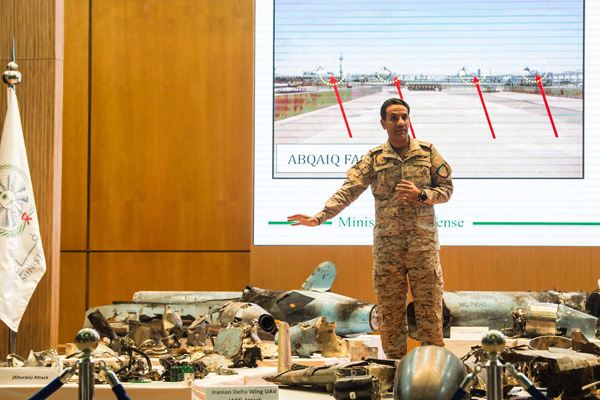
On Monday, Malki said that the kingdom was capable of protecting its economic facilities. “Saudi Arabia has a great deterrent force against any threat, regardless of its source,” he said.
Houthi attacks against Saudi Arabia continued Monday despite regional and international condemnation, with US State Department spokesman Ned Price describing Houthi acts as “unacceptable” and stressing they put civilians at risk, including Americans.
The Saudi-led coalition said it had intercepted and destroyed a ballistic missile fired towards the Saudi city of Khamis Mushait and a drone launched towards the kingdom’s southern region by Yemen’s Houthi group, Saudi state media reported on Monday.
The Houthis said on Sunday they had launched a Zulfiqar missile, which has a range of some 700km, and ten armed drones at the eastern cities of Ras Tanura and Dammam. They fired seven Badr missiles and four drones at the southern cities of Asir and Jazan, their military spokesman said.
Tanura and Dammam, two sites in the Eastern Province, are located just a few kilometres from the Aramco facilities targeted in 2019. Riyadh blamed that attack on Iran, a charge Tehran denies.
Iran’s fingerprints
Houthi militias recently stepped up cross-border attacks in a conflict widely seen as a proxy war between Saudi Arabia and Iran, which are locked in a decades-old rivalry for regional influence.
While Sunday’s attacks did not result in any oil production outages, they underscored “just how dangerous the security environment remains in the region nearly 18 months after the September 14, 2019” strikes, said Helima Croft, head of global commodity strategy at RBC Capital Markets, in a research note.
Saudi Arabia’s defence ministry spokesman on Monday accused Iran of smuggling missiles and drones to Houthis.
Colonel Turki al-Malki, who is also spokesman of the Saudi-led military coalition battling the Houthis, was speaking on Saudi-owned Al Arabiya television.
Kingdom better prepared
According to experts, Saudi Arabia fared far better on Sunday, when it faced missile and drone attacks on its oil heartland with no serious damage, than 18 months ago when strikes forced it to temporarily shut its industry down.
Military experts believe that is partly down to better preparation. But the kingdom still remains more vulnerable to drones and low-flying cruise missiles than to high-flying ballistic missiles it was able to shoot down this week.
A September 2019 strike hit two key plants with cruise missile and drones. This time, Saudi-led coalition authorities said most of Sunday’s drones and missiles were intercepted en route to their targets and there were no casualties or property losses from the attacks.
“It looks like the Saudis have been working hard to fill in the gaps, including with the Patriot deployment at Ras Tanura, which now appears to have paid off,” said Jeremy Binnie, Middle East and Africa Editor of Janes Defence Weekly, referring to a US-made long-range surface-to-air missile system.
Binnie said US military reinforcements at Prince Sultan Air Base after the 2019 attacks had helped free Saudi assets to be moved elsewhere, and France and Britain had also provided radars to help track low-flying threats such as drones.
The Patriot system is designed mainly for high-altitude ballistic missile attacks, which the kingdom has often had to deal with since intervening at the head of a coalition in Yemen six years ago.
Risks persist
But Saudi Arabia remains vulnerable due to its size, evolving threats and human error, the experts said.
Low-flying cruise missiles and drones, which are much smaller targets, may not be picked up in time by ground-based radar. Intercepting drones with Patriots is also extremely expensive, with each missile costing around $3 million.
“The Saudis are not badly equipped,” said Douglas Barrie, senior fellow for military aerospace at London-based IISS think tank.
“There are a range of things to use against UAVs and ballistic missiles,” he said, using an acronym for unmanned aerial vehicles, or drones. “They have used them successfully and they are getting better at it, but you are never, ever going to be 100% successful.”
On Monday, Malki said that the kingdom was capable of protecting its economic facilities.
“Saudi Arabia has a great deterrent force against any threat, regardless of its source,” he said.
Meanwhile, US State Department spokesman cautioned against the risks Houthi attacks pose to international attempts to resolve the conflict in Yemen.
In this regard, Price said Houthis must demonstrate willingness to engage in a political process to achieve peace in Yemen.
“They [Houthis] have to demonstrate their willingness to engage in a political process. They need to quite simply stop attacking and start negotiating,” Price said.
“Only then will we be able to make progress towards the political settlement that we’re after,” he added.
 Eurasia Press & News
Eurasia Press & News



